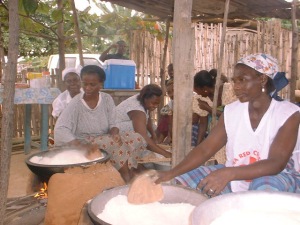
Mrs Theresa Nobiya, Coordinator for Health, Ghana Red Cross Society
The Ghana Red Cross Society (GRCS) has over the years undergonea gradual shift from a purely emergency disaster relief organisation to a development orientated orgnaisation whose programmes aim at reducing the impact of disasters on vulnerable groups.
| The GRCS initiated programmes like "healthy Living" and "Health in the Home" in the 1970s. This later evolved into the Primary Health Care Programme of the Society. A group of women were brought together to form a Mothers Club at Nsuopon, a small village near Wassa Akropong in the Western region of Ghana. Literacy was no barrier. The women were taught childcare, nutrition, personal hygiene, environmental sanitation and first aid. The women later realized a drastic reduction in the occurrence of measles and whooping cough (pertussis) in the whole village and this raised their enthusiasm. The good news spread fast and women from surrounding villages came together to form similar clubs. The experience in the Western Region led to the formation of Red Cross Mothers Clubs in other parts of the country. |  Mrs Theresa Nobiya, Coordinator for Health, Ghana Red Cross Society |
There are currently over 400 Mothers Clubs spread throughout all the 10 political regions of Ghana. Over 6000 members are active, ie they attend meetings regularly.
|
A Mothers Club clean up an area next to an orphanage. Rubbish, including animal faeces, encourages vermin and poses a serious risk to children's health. |
Objectives of Mothers Clubs
|
Activities of Mothers Clubs
The operations of Mothers Clubs falls within the Primary Health Care and Community Service Programmes of the Ghana Red Cross Society. Effort is however made to involve other programme areas like Youth, Disaster Relief and Preparedness, Fund-raising and Membership Development, Information Dissemination and Human Resource Development, in the execution of Mothers Club projects.
There are 5 main areas of activity for Mothers clubs. There are:
| 1. Dissemination of Information about
the Red Cross Society
Mothers Clubs members are provided with basic understanding of the history and principles of the Red Cross Society and its role in conflict and disaster situations. This is to enable them to explain what the Red Cross Movement is all about to other people, especially to potential members. In areas which are prone to tribal conflicts, much emphasis is put on the Principles of Neutrality, Impartiality and Voluntary Service. |
|
|
2. Primary Health Care The concept of Primary Health Care seeks to make the health care delivery system more accessible to all with emphasis placed on disease prevention and health promotion through community participation.Mothers Clubs play a key role in this programme. a) First Aid Training b) Public Health Education c) Social Infrastructure |
|
|
The Ghana Red Cross Society also provides leadership training for Mothers Clubs members as part of its human resources development programme. The capacity of the leaders of Mothers Clubs to promote healthy living in their communities is thus strengthened.
|
|
|
|
4. Income Generating Activities The principal aim is to enable women to earn enough to supplement family income so that they may fight malnutrition and have the means to put into practice what they have been taught about the health care and feeding of their families. |
 Dodowa Mothers Club preparing garee from cassava, as an income generating activity |
5. Community Service.
Community Service is one of the cornerstones of the Ghana Red Cross Society and this is also promoted in the Mothers Clubs. Recently some clubs have started functional literacy classes for their members.
In areas which are threatened by desertification Mothers Clubs members actively promote tree planting.
For further information, contact:
Ghana Red Cross Society National Headquarters
Ministries Annex, Block A3
P.O. Box 835
Accra, Ghana
Tel. : (021) 662298/767460
Fax: (021) 667226
This text for this page has been prepared from a leaflet produced by Ghana Red Cross Society, reproduced by permission. Images copyright Ghana Red Cross Society.
Page constructed 12 September 2001